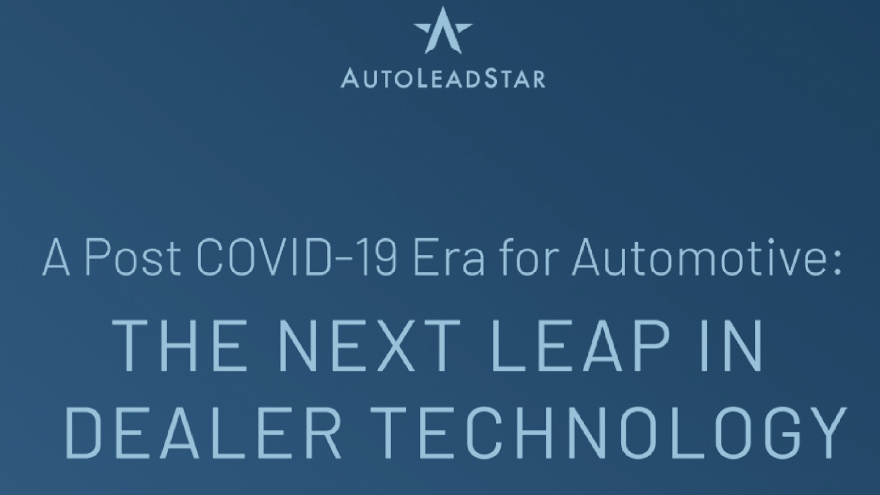COVID-19: Accelerating digitization of automotive retail

Image courtesy of AutoLeadStar.
By subscribing, you agree to receive communications from Auto Remarketing and our partners in accordance with our Privacy Policy. We may share your information with select partners and sponsors who may contact you about their products and services. You may unsubscribe at any time.
MIAMI –
The COVID-19 pandemic has placed a spotlight on the need for dealers to act quickly in adopting the tools and practices of the future. If dealers want to succeed in a post-COVID-19 future, they must move decisively to build out their digital-first competency and infrastructure.
According to a new report titled, “A Post COVID-19 Era for Automotive: The Next Leap in Dealer Technology,” the pandemic’s disruption of the U.S. car market has created an opportunity to advance digital and AI-based automated marketing technologies to dealers.
“With showrooms closed or operating under strict limitations, dealers are highly motivated to adopt new technologies that enable digital transformation, hyper-targeted digital marketing and remote selling,” states the report, which was written by auto industry marketing automation company, AutoLeadStar.
The report highlights four trends addressing the digital and AI-based automated marketing technologies opportunity, which AutoLeadStar believes “will bring the greatest transformation the industry has seen since Cars.com and AutoTrader led a wave of digitization in the late 1990s.”
The features that AutoLeadStar believes will shape the next two years include:
— Accelerated adoption of in-house dealer technology versus outsourced marketing agencies
Subscribe to Auto Remarketing to stay informed and stay ahead.
By subscribing, you agree to receive communications from Auto Remarketing and our partners in accordance with our Privacy Policy. We may share your information with select partners and sponsors who may contact you about their products and services. You may unsubscribe at any time.
— Ascendance of AI-based tools to segment, convert, and close high-intent shoppers
— Emergence of new buying personas and in-market shopper behaviors
— Unprecedented technology-driven operational efficiency
“These trends will transform the way that dealers market and engage customers,” AutoLeadStar writes.
Regarding the first trend addressing accelerated adoption of in-house dealer technology versus outsourced marketing agencies, AutoLeadStar writes that COVID-19 is placing pressure on the “traditional dealership model of clicks-to-bricks, anchored by a first-class showroom experience.”
The disruption of consumer shopping behavior is highlighting “the grim state of dealer and OEM digital infrastructure,” the report states. Dealers today can adopt the right technologies to thrive rather than languish in the new market reality.
The report states that AI and smart marketing platforms are essential to a “post-COVID-19 marketing funnel.” Companies can offer an advanced digital-first marketing automation solution to dealers, who will be interested as their advertising budgets and profit margins will be reduced.
An increasing segment of the dealership market is now searching for tools that can target high-intent shoppers, the report states.
“While the COVID-19 crisis may signal a conclusion to the historic five year run of the industry, it also signals the beginning of a new era in automation and digital-first technology,” the report states.
Regarding the second trend on the ascendance of AI-based tools to segment, convert, and close high-intent shoppers, the report states that although sales have declined nationally across new and used categories in every brand, AutoLeadStar data shows that shopping behavior has remained “robust” throughout the crisis. Consumer search and website traffic for automotive have remained largely steady since the initial drop in mid-March, the report states. But buying signals such as lead conversion and sales have lagged in most markets. Dealers still must aggressively explore new tools that move the needle on two key objectives:
— Segment and convert high-intent buyers to sales
— Engage wait-and-see buyers to accelerate their buying momentum
The report mentions additional possible future trends as possible influences of car buying over the next six to 18 months:
— Single-car suburban families may become two-car suburban families
— Business commuters may return to driving for short-haul work trips.
— Millennials may buy a car earlier than prior to the crisis.
— Families may turn to road travel for vacations, rather than flights.
AutoLeadStar concludes by stating a solid case exists that the ingredients for the auto industry recovery are already underway. Dealers must rapidly “scale up” their digital marketing and automated retail technology.
“This trend is likely to strengthen as behaviors unique to the COVID-19 crisis become further entrenched,” AutoLeadStar writes.
"Since the pandemic, it has been very difficult to drive traffic to the showroom as well as identify buyers within web traffic," AutoLeadStar chief executive officer Aharon Horwitz said in a news release.
Horwitz continued, “We’ve seen rapid adoption of a digital retail model due to these changes and because of this, dealerships must make digital the priority and invest in technology over account services into the second half of 2020 and early next year.”


